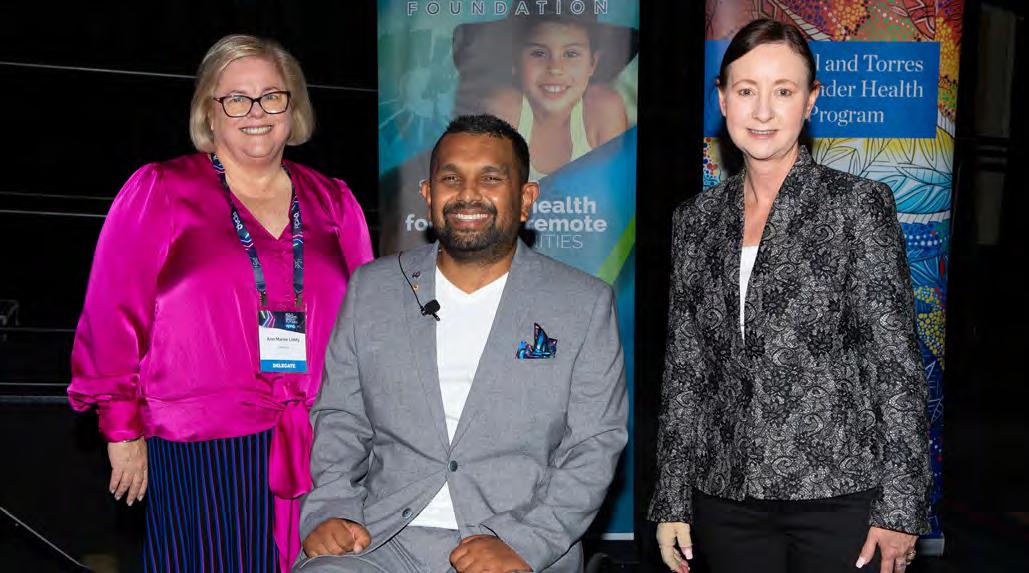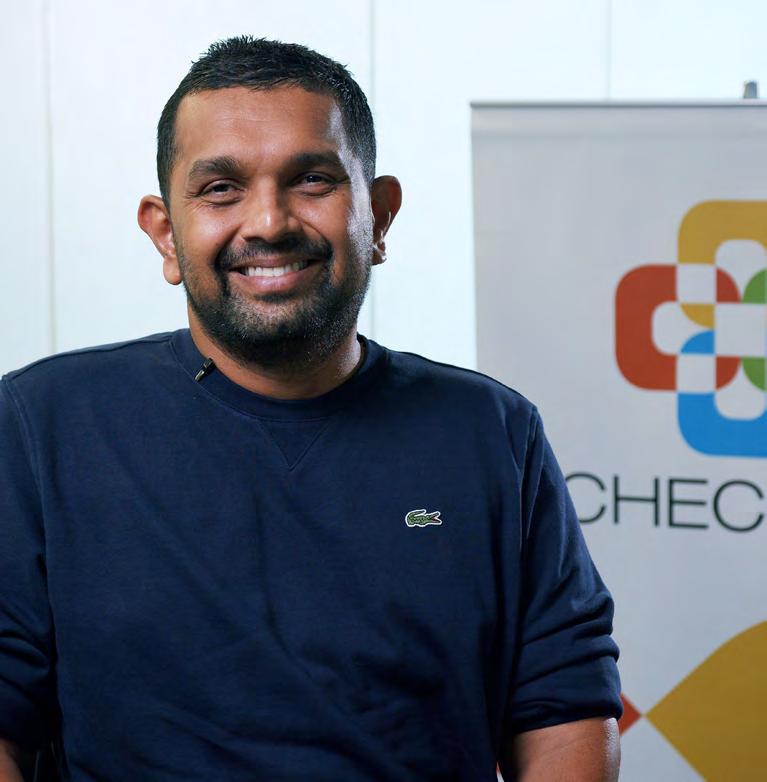
10 minute read
HEALTH
New AI research progress could help save premature babies
JAMES Cook University scientists believe they have made a breakthrough in the science of keeping premature babies alive.
Advertisement
As part of her PhD work, JCU engineering lecturer Stephanie Baker led a pilot study that used new artificial intelligence technology to accurately predict how much risk individual premature babies face.
She said the JCU team’s research had developed the Neonatal Artificial Intelligence Mortality Score (NAIMS), a hybrid neural network that relies on simple demographics and trends in heart and respiratory rate to determine mortality risk.
“This is the first work we’re aware of that uses only easyto-record demographics and respiratory rate and heart rate data to produce an accurate prediction of immediate mortality risk,” said Ms Baker.
Complications resulting from premature birth are the leading cause of death in children under five with over 50 per cent of newborn deaths occurring in preterm infants.
“Preterm birth rates are increasing almost everywhere. In neonatal intensive care units, assessment of mortality risk assists in making difficult decisions regarding which treatments should be used and if and when treatments are working effectively,” said Ms Baker.
She said that to guide their care, preterm babies are often given a score that indicates the risk they face but that there are limitations to the current system.
“Generating the score requires complex manual measurements, extensive laboratory results, and the listing of maternal characteristics and existing conditions,” said Ms Baker.
“Due to the simplicity and high performance of our proposed scheme, NAIMS could easily be continuously and automatically recalculated, enabling analysis of a baby’s responsiveness to treatment and other health trends,” said Ms Baker.
She says that with improvements in AI like the Neonatal Artificial Intelligence Mortality Score (NAIMS) babies can be better monitored without the need for time-consuming and invasive procedures.
Ms Baker said the next step in the process was to partner with local hospitals to gather more data and undertake further testing.
“An ideal scheme would be one that uses fundamental demographics and routinely measured vital signs to provide continuous assessment. This would allow for assessment of changing risk without placing an unreasonable additional burden on healthcare staff,” said Ms Baker.
“Additionally, we aim to conduct research into the prediction of other outcomes in neonatal intensive care.”
Students with overconfident parents perform better in school

Marina Trajkovich
A NEW study led by the Conversation and Society for Research in Child Development shows that overconfidence in your children’s academic abilities can actually help improve their grades.
The study examined 2,602 Australian children and the attitudes of their mothers to determine the degree to which positive optimism would have an impact on a child’s academic performance over time.
The study asked Aussie mums to rate their children’s numeracy and maths skills and their reading abilities as below average, average or above average, which determined parental optimism and pessimism in their kid’s abilities at school.
These attitudes were then compared to the student’s actual results in standardised NAPLAN testing through years 3, 5 and 7 to determine whether parental views were accurate representations of student ability.
The study found that students with parents who held overly optimistic perceptions of their grades actually improved significantly more over a two year testing period, compared to students whose parent’s had more realistic or pessimistic views of their abilities.
“We found, on average, mums were more optimistic about their child’s ability than their child’s school results suggested. We found this improved not only their kid’s later school results but also increased their interest in school,” wrote one researcher in the report published by the Conversation.
By comparing NAPLAN results between a two year period researchers Philip D. Parker, Taren Sanders, Jake Anders, Rhiannon B. Parker and Jasper J. Duineveld were able to confirm that parental optimism consistently benefited students.
“Overly optimistic parents could reduce their kids’ drive to work harder and give them a false idea of the opportunities available to them. Or this same optimism could fill the child with confidence, kindle their self-belief and give them the courage to try harder.
“We set out to discover which of these possibilities is most likely, and we found a mother’s optimism about how good their child is in maths and reading consistently benefited children,” said the report.
The study also revealed a degree of gender stereotyping amongst parents, where girls were perceived to be better in reading and boys in numeracy.
There was no perceived link between a mothers optimism and socioeconomic status as initially hypothesised. However it was found that mothers from non-English speaking background, had higher levels of optimism in their children’s academic abilities. THE Dry July Foundation is encouraging Aussies to give up alcohol for the month of July, advocating the health benefits of skipping drinks for a month while raising money for cancer research.
With most adult Aussies consuming alcohol to some degree, giving it up for the month can seem a daunting task, but one that has a myriad of health benefits, impacting your energy levels, quality of sleep and improving your overall mood and daily functioning.
Reducing or curbing your drinking habits can also have a positive impact on your finances.
Advice from the National Health and Medical Research Council (NHMRC), suggests no more than 10 standard drinks a week and no more than 4 in a single drinking session.
Tips for managing Dry July
1 If you’re considering giving up the grog for the whole month, DryJuly.com has several resources and ideas for how to stay on track, like alternative ways to socialise that don’t involve a typical visit to a bar. 2 Set a goal for yourself and get moving, by using the month to focus on improving your lifestyle and your health. Cravings are natural and so experts recommend mindfully acknowledging the discomfort but ultimately using will power to refocus on what you are achieving for your body and mind. 3 Focusing on the health benefits can help you stay on track. After one week of giving up drinking, you might notice that your sleep quality is improving, you’re saving calories and you’re more hydrated. After a month, your skin will look visibly healthier and your liver function will have improved and the fat surrounding it reduced, impacting the 500 vital functions it performs from removing contaminants and converting food to nutrients within your body.

Go Dry this July
Marina Trajkovich
Training course aims to improve health care access for people with disabilities
Marina Trajkovich

A NEW online training course has been created with the aim to make mainstream health care accessible for people with disabilities in regional, rural and remote Queensland.
The two hour online training course was created by CheckUP, a not-for-profit organisation working to better health outcomes for marginalised communities and is part of a three year project funded by the National Disability Insurance Agency (NDIA).
The course is aimed at health care providers, to help reduce the barriers impacting people with disabilities and to improve access to care.
The course was launched at the Rural Doctors Association of Queensland Conference in the Gold Coast, by Queensland’s Australian of the Year, Dr Dinesh Palipana, a doctor with the Gold Coast University Emergency Department and disability advocate.
He says that educating health practitioners is crucial in making mainstream healthcare spaces more inclusive and has been using his own experiences in the health system to develop the online course.
“In my own journey with a spinal cord injury and quadriplegia, I realised a lot of the barriers and assumptions people face when accessing the health care system,” said Dr Palipana.
“I’ve had instances where life threatening issues have nearly been missed, where I’ve had difficulty physically accessing health care environments, and experienced complications in the health care system due to my social circumstances.
“It’s important that health care providers understand that the ways they may have traditionally approached a person with a disability don’t always work and they need to be treated as individuals.”
CheckUP Chief Executive Officer Ann Maree Liddy said developing the Access For All course was a collaborative effort to ensure the content was relevant and outcome focused to improve the lives of people with disabilities.
“We consulted with consumers who have lived experience of disability, service providers, health professionals, disability networks and advocates to identify the common issues and challenges experienced by people with disabilities and how we can build a more accessible and inclusive health care system,” she said.
“It has become very apparent that while most health professionals and clinics are well meaning, many are inadvertently creating barriers or making assumptions about a person’s disability, which can lead to treatment errors or a reluctance for patients to seek treatment.”
Ms Liddy said that for some health professionals and practices, the training will reinforce the steps they are already taking, but for others it may prompt a transformation process for their organisation or service to be more accessible.
“It starts with education, and Access For All is an introductory step for health care providers to ensure they are aware of their obligations under the Human Rights and Disability Discrimination Acts to deliver culturally and clinically appropriate care, whilst providing inclusive, accessible health services for people with disabilities.”
CONNECT NOW:
For more information about the course and to access resources, contact Alison Berigan at aberigan@ checkup.org.au.

Doctor and disability advocate Dr Dinesh Palipana
CheckUP CEO Ann Maree Liddy, Dr Dinesh Palipana and the Hon. Yvette D’Ath Minister for Health Queensland
Emergency departments still flooded with non-urgent cases
Marina Trajkovich
A NEW study has found that a large percentage of people are still attending hospital emergency rooms with problems that could be dealt with by a GP, placing additional and preventable strain on hospital staff.
The study was led by Dr Yaqoot Fatima from James Cook University and the University of Queensland as well as researchers from the JCU’s Murtupuni Centre for Rural and Remote Health, who analysed incidents at a Mount Isa remote emergency department.
Dr Fatima said that it’s a trend that’s increasing rapidly, with misuse of emergency services for minor ailments creating potential delays for those in need of emergency care.
“National data shows that around 35 percent of ED attendances are for less urgent problems. In rural communities, the number of people using the ED for less urgent problems is up to 70 per cent,” said Dr Fatima.
Dr Fatima said younger age, lack of information about local GP services, and perceptions of convenience contributed significantly to seeking ED care and that patients with tertiary education were also less likely to visit an ED for health matters a GP could address.
The study found that young adults, from 18-35 were the highest non-essential users.
The top three presenting diagnoses were viral infections, upper respiratory infections and wound care.
Dr Fatima says that raising awareness of when and when not to call emergency services could be a solution to the problem, so that paramedics can better utilise time for patients requiring urgent care.
“The community needs reassurance that GP clinics are resourced to manage the breadth of primary medical care, including immunisation and STI screening, adult health checks, and chronic disease management,” said Dr Fatima.
CONNECT NOW
If you’re not sure if your medical condition is an emergency, call 13 HEALTH (13 43 25 84) or visit a GP or a pharmacist for medical advice. In an emergency, call Triple Zero (000) and ask for an ambulance.

WHEN TO VISIT A GP
GPs can treat many conditions you might otherwise go to an Emergency department for, such as removing stitches, sprains and strains, bites and stings, viruses or infections, eye injuries, and prolonged illness or injury. General conditions that can be seen by a GP: • viruses • cold and flu symptoms • open wounds, surgical dressings and sutures • prolonged illness or injury • eye injuries • abdominal pain • urinary tract infection • vomiting • sprain - existing • acute respiratory infection, for example, pneumonia, bronchitis • bites, rashes, skin infections • severe headache • earache • tonsillitis • wound infection • medical certificate
Call 13 HEALTH (13 43 25 84) or search the health services directory to find out if there are any after-hours GP clinics or night GPs close to you. Pharmacies can help with conditions such as cold and flu symptoms, skin conditions and irritations, minor or mild allergy symptoms, headaches, diarrhea or constipation, or sleeping problems. Go to a pharmacist for: • skin conditions and irritations • mild and minor allergy symptoms • diarrhea • constipation • sleeping problems • deep cuts






